 The group of students I was mentoring won the first prize of the “Bio Microfluidics Engineering Design Award 2013” for the best microfluidic design of a novel method to realize PCR on chip.
The group of students I was mentoring won the first prize of the “Bio Microfluidics Engineering Design Award 2013” for the best microfluidic design of a novel method to realize PCR on chip.
The task was about: “Precise temperature control in a microfluidic chip”.
Here is the requirement for my group:
“Controlling the temperature is an important issue especially when dealing with biological material which are often sensitive to temperature changes. In macroscopic systems this can be easily done and several techniques gives good results with little effort. In microfluidic precisely modify the temperature in a short time, or define zones within the same chip with different temperature, can be tricky. Design a microfluidic chip to perform Polymerase Chain Reaction (PCR). This require to load a sample of 50-100 μl prepared at room temperature in the chip and then rapidly switch its temperature. The sample should experience three different temperatures for different period of time. In order for PCR to be effective in replicating DNA it is necessary that the temperature changes is fast (within 2-3 seconds), and that its value is stable (temperature cannot varies more than 1-3% over the whole period of time). The sample will undergo these three steps: 1. denaturation of DNA: temperature of 94 °C for 30 seconds; 2. annealing: temperature of 50 °C for 20 seconds; 3. extension/elongation: temperature of 72 °C for 25 seconds. The three steps above compose a PCR cycle. The sample must undergo at least 30 PCR cycles to have appreciable DNA amplification.”
And my group came up with a winning design!
Well done!
